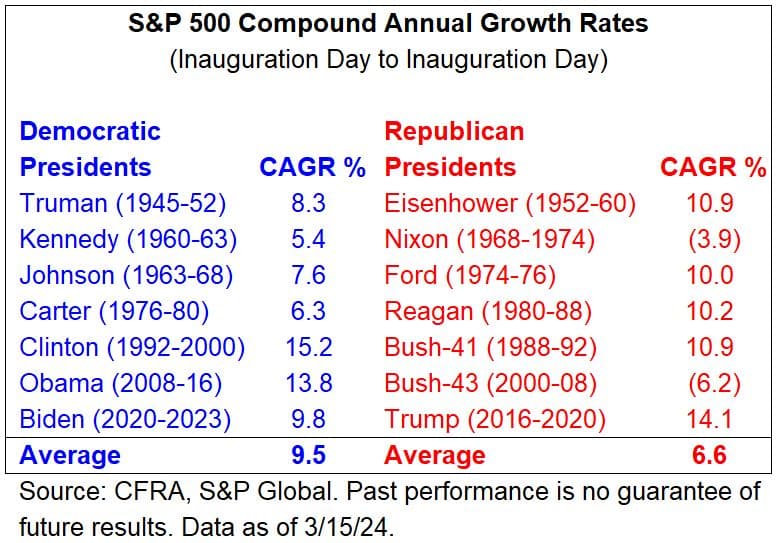
Keep calm and don’t mix politics with your portfolio
Mickey Kim / April 5, 2024
Now that a November rematch between President Joe Biden and former president Donald Trump is a fait accompli, it’s time for investors to prepare themselves mentally for the impending political storm. I never make predictions, particularly in writing, but it’s a sure bet the vitriol and partisan political assault we’re all going to be bombarded with over the next seven months will make 2020 seem like a songfest around the campfire.
Both Biden and Trump (and their supporters) predict doom if the other is elected. Information is filtered through the lens of confirmation bias, our tendency to give too much weight to findings that support our existing beliefs. Unfortunately, it’s increasingly rare for folks (including me) to listen openly to opposing views, let alone seek out alternate perspectives and attempt to understand.
Unfortunately, as our country has become even more politically polarized, people tend to seek comfort in print, TV and social media “echo chambers.” As Simon & Garfunkel sang in The Boxer, “a man hears what he wants to hear and disregards the rest.”
As the partisan storm increases in intensity over the coming months, you may be tempted to make changes to your portfolio because of how you believe a short-term event like an election will impact the financial markets. Don’t. Making an anxiety-based change because of your political beliefs will be harmful to the long-term health of your portfolio.
The president is only one of many factors that influence the market. Others, including corporate profitability, interest rates and inflation may have more impact than who resides in the White House.
My friend Sam Stovall, Chief Investment Strategist for Wall Street research firm CFRA, dissected price changes for the S&P 500 going back to 1945 based on election results.
Republican administrations are generally viewed as “pro-business” and conventional wisdom is stocks do better with a Republican in the White House. There has, indeed, been a huge difference in returns during Democratic vs. Republican administrations. However, as is often the case, conventional wisdom is wrong. Past performance is no guarantee of future results, but Stovall calculated from Harry Truman’s inauguration on April 12, 1945 through March 15, 2024, the average annual return for the S&P 500 was 44% higher with Democrats in the White House (9.5% vs. 6.6% during Republican administrations).

Further, according to Invesco and Haver Analytics, hypothetically speaking, the best-performing portfolio from 1900 to 2023 was the “bi-partisan” one that stayed fully-invested in the Dow Jones Industrial Average (a price-weighted index (cannot be invested in directly) of the 30 largest, most widely held stocks traded on the New York Stock Exchange) during both Democratic and Republican administrations. Again, past performance is no guarantee of future results, but starting with $10,000, this portfolio grew to almost $9.9 million.
Conversely, a “partisan” portfolio, invested only during Democratic or Republican administrations underperformed by millions of dollars. The same $10,000 invested only during Democratic administrations grew to about $528,000. Invested only during Republican administrations, the initial $10,000 grew to a bit less than $181,000.

As you can see, there can be a huge cost to letting a partisan political storm crash your portfolio. Develop an investment plan based on your long-term goals and stick to it. Your financial future will depend far more on how much you save and invest, not who wins the election.
The opinions expressed in these articles are those of the author as of the date the article was published. These opinions have not been updated or supplemented and may not reflect the author’s views today. The information provided in these articles are not intended to be a forecast of future events, a guarantee of future results and do not provide information reasonably sufficient upon which to base an investment decision and should not be considered a recommendation to purchase or sell any particular stock or other investment.









